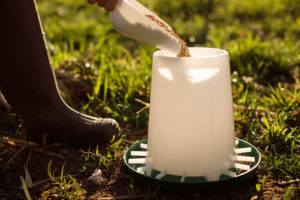Some important factors to consider when storing poultry feed include temperature, moisture, and pests. Feed should be stored in a cool, dry, and well-ventilated area to prevent mold and mildew growth. Additionally, moisture can attract pests like rodents and insects, so it's important to keep your feed bins sealed and pest-resistant. Make sure to regularly inspect your storage area for any signs of pest infestation and take appropriate measures to keep them at bay.

One popular option for poultry feed storage is metal bins. Metal bins are durable, weather-resistant, and pest-resistant. They also come in a variety of sizes, making them suitable for both small and large poultry operations. Another option is plastic bins, which are lightweight and easy to move around. However, plastic bins may not be as durable as metal bins and may be more susceptible to damage from extreme temperatures or rough handling.
There are also automated feed storage systems that can help you manage your feed more efficiently and effectively. These systems come in various designs, but all function to monitor and regulate the quality and quantity of your feed. They can help you save time and money by reducing waste and ensuring consistent feed distribution.
In conclusion, proper poultry feed storage is crucial for maintaining the health and productivity of your flock. Whether you opt for metal or plastic bins, or invest in an automated feed storage system, make sure to prioritize temperature, moisture, and pest control. With the right storage and management practices, you can ensure that your birds are getting the best quality feed possible. So, invest in your feed storage today and watch your poultry business thrive!
